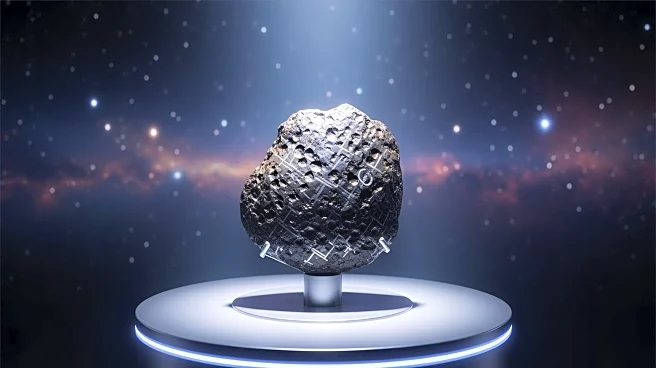What's Happening?
A team of researchers from MIT has discovered remnants of the proto Earth, a primitive form of the planet that existed over four and a half billion years ago. This discovery was made through the analysis
of meteorites, which revealed a unique chemical anomaly in ancient rock samples. The proto Earth was drastically different from the current Earth, characterized by a molten surface. It was believed to have been destroyed by a collision with a Mars-sized object, which also led to the formation of the Moon. The research team, led by Nicole Nie, identified a potassium isotopic anomaly in meteorites, which did not match the composition of present-day Earth samples. This anomaly suggests that the original material of proto Earth has been preserved, providing a tangible link to the planet's early history.
Why It's Important?
The discovery of proto Earth's remnants is significant as it offers new insights into the early composition and evolution of our planet. Understanding the original chemical makeup of Earth can help scientists trace the planet's formation and the processes that led to its current state. This research challenges existing theories about Earth's building blocks and suggests that the meteorite inventory used to study planetary formation is incomplete. The findings could lead to a reevaluation of how Earth and other planets in the solar system developed, potentially impacting fields such as geology, planetary science, and astrobiology.
What's Next?
The research team plans to continue analyzing ancient rock samples to further understand the chemical composition of proto Earth. This ongoing study may reveal more about the planet's early history and the processes that shaped its evolution. Additionally, the findings could prompt other scientists to reexamine meteorite samples and explore new methods for studying planetary formation. As the research progresses, it may lead to collaborations with other institutions and the development of new technologies for analyzing geological samples.
Beyond the Headlines
The discovery raises questions about the completeness of current meteorite inventories and the assumptions made about Earth's formation. It highlights the need for a broader exploration of planetary materials and the potential for uncovering new information about the solar system's history. The research also underscores the importance of interdisciplinary collaboration in advancing our understanding of planetary science.









